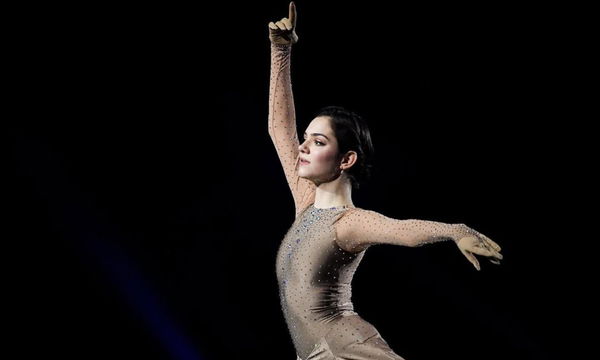

When it comes to figure skating, few countries have the level of grip on the sport that Russia does. But even among them, there is one former skater who took it even further. From skating routines that told stories to records that redefined what was possible for people. Just look at her achievements by age 18: twice a World Champion, twice a European Champion, the first woman to ever score over 80 in the short program and 160 in the free program, and a silver medalist at the 2018 Pyeongchang Winter Games—she earned worldwide acclaim. But the price of perfection? It wasn’t just physical. And it wasn’t always her own choice.
Honestly, what happened after Pyeongchang wasn’t the kind of drama anyone saw coming. Evgenia Medvedeva had just returned home with Olympic silver and a resume already worthy of legend. But the moment she walked into her family kitchen, the spotlight faded, and reality struck. “I came home. My mom knew I had been keeping myself in very strict shape, essentially eating nothing,” Medvedeva recalled as quoted by Gossip.com.
“At the time, she didn’t yet understand what eating disorders were.” To celebrate her Olympic feat, her mother set out a feast. With the likes of sausages, potatoes, and herring, it was “all the most delicious dishes,” in Medvedeva’s words. But instead of a cordial lunch, what followed was something that Medvedeva still struggles with. She continued, “Half an hour later, I had eaten the entire table.”
ADVERTISEMENT
Article continues below this ad
With a solemn mood, she recounts, “My mom walked into the kitchen and just…” But for Evgenia, this moment remained buried until the interview reopened her old wounds. She mentions how soon after this incident, she asked her mother, “What did you think about me at that time?” To that, Medvedeva’s mother replied, “That’s when I understood what an eating disorder is.”

Medvedeva’s confession peels back the rhinestone curtain, hiding figure skating’s harshest realities. The sport demands impossible precision from changing adolescent bodies. Skaters train relentlessly and are judged not just for their athleticism but also for how they look doing it. In fact, former US skater Jenny Kirk once estimated that 85% of skaters—male and female—struggle with disordered eating.
And with the rise of the “quad era,” the pressure is even more crushing. When bodies change, jump heights drop—and the instinct isn’t to fix technique but to shed weight. “I don’t know how all of that food fit inside me,” Medvedeva said. “It was like I was a bottomless pit.”
ADVERTISEMENT
Article continues below this ad
What’s your perspective on:
Is the pursuit of perfection in figure skating worth the toll it takes on athletes' health?
Have an interesting take?
It is not just Evgenia Medvedeva
While Russian star Evgenia Medvedeva’s struggles have brought renewed attention to the sport’s dark underbelly, several other top skaters have spoken out about similar battles. Jennifer Kirk, the 2000 World Junior Champion and 2002 Four Continents gold medalist, has been one of the most outspoken voices. “Eating disorders are incredibly secretive,” she said on HuffPost, explaining how difficult it is to spot sufferers from the outside.
“It wasn’t until I was on tour, spending months at a time with the best skaters in the world, that I saw how prevalent disordered eating was amongst the top skaters in the sport.” Japanese skater Akiko Suzuki, the 2012 World bronze medalist, revealed she was diagnosed with anorexia before the 2014 Sochi Olympics. She had lost nearly a third of her body weight in just two months.
ADVERTISEMENT
Article continues below this ad
Gracie Gold, a two-time U.S. national champion and Olympic bronze medalist, has spoken about eating “one meal a day after training for hours.” She took time away from competition to seek treatment. Canadian Olympian Gabrielle Daleman, World bronze medalist, shared she would “write down the calories … then burn double it.”
ADVERTISEMENT
ADVERTISEMENT
ADVERTISEMENT
ADVERTISEMENT


Is the pursuit of perfection in figure skating worth the toll it takes on athletes' health?